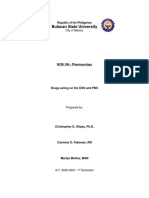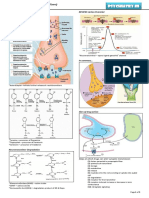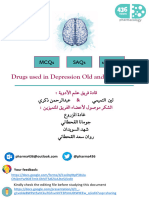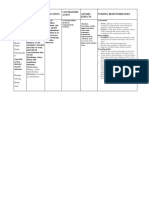2023 - The Clinical Application of Cariprazine in Schizophrenia
2023 - The Clinical Application of Cariprazine in Schizophrenia
Uploaded by
Ana BorgesCopyright:
Available Formats
2023 - The Clinical Application of Cariprazine in Schizophrenia
2023 - The Clinical Application of Cariprazine in Schizophrenia
Uploaded by
Ana BorgesOriginal Title
Copyright
Available Formats
Share this document
Did you find this document useful?
Is this content inappropriate?
Copyright:
Available Formats
2023 - The Clinical Application of Cariprazine in Schizophrenia
2023 - The Clinical Application of Cariprazine in Schizophrenia
Uploaded by
Ana BorgesCopyright:
Available Formats
The clinical application of
Cariprazine (Reagila®)
for the treatment of Schizophrenia
Cariprazine (Reagila®)
Cariprazine (Reagila®) is a third-generation oral Table 1: Dosing considerations for Cariprazine (Reagila®)
antipsychotic and partial dopamine receptor in adults with Schizophrenia.3,8
agonist,1 approved in 2020 for the treatment of
schizophrenia.2,3 Cariprazine clinical trials have
demonstrated efficacy in treating both positive and DOSING
negative symptoms in patients with schizophrenia.1-3
Positive symptoms including hallucinations and Recommended starting dose of cariprazine is 1.5 mg once daily.
delusions, can be debilitating, and to be adequately
Dose can be increased in 1.5mg increments according to efficacy and tolerability
controlled they require prompt treatment.2 Negative
to a maximum dose of 6mg/day, if needed. The lowest effective dose should be
symptoms such as anhedonia, avolition, asociality,
maintained according to the clinical judgement of the treating physician.3
alogia and flattened affect can be just as distressing.1
Previous antipsychotic treatments, with the When severe symptoms are present there is generally a need to quickly achieve a
exception of amisulpride, have not demonstrated higher dose. Such patients generally require a maintenance dose of 6.0 mg/daily.8
efficacy in the treatment of negative symptoms, As cariprazine has a long half life, changes in dose may not be reflected in plasma for
and were often discontinued due to unpleasant side several weeks.3
effects or non-adherence (Figure 1).2 Cariprazine
Patients should be monitored for adverse reactions and treatment response for several
offers an effective alternative, particularly to weeks after starting cariprazine and following each dose change.3
patients impacted by functional symptoms.1-4
If a patient misses a dose they should take the missed dose as soon as possible. If the
Pharmacodynamics next dose is due then the missed dose should be skipped and the next dose taken
according to the usual schedule. Double dosing is not recommended.8
Cariprazine has a higher affinity for Dopamine D3
than dopamine itself.5,6 This unique pharmacological
profile leads to enhanced dopaminergic and SPECIAL POPULATIONS3
cholinergic neurotransmission, which is thought
to reduce negative symptoms while improving Renal impairment: No dose adjustment is required in patients with mild to
moderate renal impairment Creatinine Clearance [CrCl] ≥ 30
motivation and reward-seeking behaviours.2,7
mL/min and < 89mL/min). Cariprazine is not recommended
Cariprazine and its two major metabolites have long in patients with severe renal impairment.
half-lives so patients should be monitored for both Hepatic Impairment: No dose adjustment is required in patients with mild to
treatment response and adverse effects for several moderate hepatic impairment (Child-Pugh score between
weeks after starting treatment or a change in dose.3 5-9). Cariprazine is not recommended in patients with severe
Cariprazine can be taken with or without food.3 hepatic impairment.
Elderly: Evidence is limited so caution should be exercised when
selecting a dose for an elderly patient.
Contraindications: Known hypersensitivity to cariprazine or any component in the
formulation.
Co-administration with strong or moderate CYP3A4 inhibitors
OR with strong or moderate CYP3A4 inducers.
©Psych Scene Pty Ltd 2023 All rights reserved.
Insomnia
Metabolic symptoms
Impulse dyscontrol
Raised prolactin levels
Restlessness
Sedation
Extra-pyramidal symptoms…
Figure 1: Reasons for switching to cariprazine from other antipsychotics (adapted from Csehi et al, 2022).2
Weight gain
A: Lack of efficacy
Negative symptoms
Psychomotor retardation
Psychotic symptoms
Agitation
Cognitive symptoms
Insomnia
Affective symptoms
Metabolic symptoms
Psychosocial functioning
Impulse dyscontrol
Relapse
Raised prolactin levels
Hostility
Restlessness
Suicidal ideation
Sedation
OCD
Extra-pyramidal symptoms…
0 2 4 6 8 10 12 14 16 18 20
B: Intolerable side-effects
Weight gain
Negativeretardation
Psychomotor symptoms
Psychotic symptoms
Agitation
Cognitive symptoms
Insomnia
Affective symptoms
Metabolic
Psychosocial
Impulsefunctioning
dyscontrol
Relapse
Raised prolactin levels
Hostility
Restlessness
SuicidalSedation
ideation
OCD
Extra-pyramidal symptoms…
0 2 4 6 8 10 12 14 16 18 20
The figure shows the number of cases in which cariprazine treatment was initiated for the given symptom (A) or the given side-effect (B).
Negative symptoms
Psychotic symptoms
Cognitive symptoms
Affective symptoms
Psychosocial functioning
The current evidence-base
Relapse
for Cariprazine Private practice
(Reagila )
®
Hostility Cariprazine is an attractive treatment option in private practice.11
The evidence-base for the use of cariprazine to treat positive and It has the longest half-life of all the oral antipsychotics making it a
Suicidal ideation
negative symptoms in schizophrenia is established.1,3,8,9 In phase useful option when non-adherence is a concern.11 Cariprazine may
OCD also be given when depot initiation is not practical, for example
II/III randomised controlled studies, cariprazine was shown to be
8 in rural10settings,
12 or where clinical support is limited. Preliminary
11
0 2
effective in reducing positive symptoms, especially during4 the 6 14 16 18 20
acute phase. In a randomised controlled trial comparing the
10 data from case reports suggest that cariprazine may also
effects of fixed-dose cariprazine at 3 mg, 4.5 mg or 6.0 mg per day reduce cravings in patients with schizophrenia and concomitant
with risperidone at 3 mg, 4 mg, or 6.0 mg per day, on predominant substance use disorders.12 Cariprazine therefore may offer more
negative symptoms (in patients with stable and limited positive choices around symptom management.
symptoms without relevant depression or extrapyramidal side
effects), cariprazine was found to be significantly more effective
at reducing predominant negative symptoms than risperidone.9
Clinical Global Impression Improvement scores and Personal and
Social Performance scores also improved, demonstrating clinically
meaningful benefits.1
©Psych Scene Pty Ltd 2023. All rights reserved.
Acute settings
Real-world recommendations from an international panel on
treating schizophrenia found that in acute settings cariprazine
was most often prescribed for people experiencing a first-episode
psychosis, many of whom were successfully managed on a
dose of 1.5 – 3 mg daily.8 Patients with more severe symptoms A pooled post-hoc analysis of the three short-term phase
generally required higher doses.8 The panel recommended rapid II/III trials in the acute setting found that, in addition to
up-titration of dosage in the acute setting (up-titrating to the the improvement in overall PANSS scores, cariprazine was
required dose in one week, depending on physician judgement) significantly better than placebo in reducing negative symptoms,
particularly when symptoms are more severe.8 When cariprazine as measured by the mean change from baseline to week 6 in the
is administered initially for first-episode psychosis to treat PANSS Marder Negative Symptom factor score.3,10
both positive and negative symptoms, there may be a lower
requirement to switch medications once positive symptoms are Community settings
controlled.8
In addition to the clinical and logistical benefits, cariprazine
also offers greater flexibility in community settings. Switching
Figure 2: Examples of switching strategies with to cariprazine from another antipsychotic may be beneficial if
cariprazine (Adapted from Rancans et al, 2022; Fagiolini the patient has negative symptoms, has been prone to non-
et al, 2020; Nemeth et al, 2017).8,9,13 adherence or experiences side-effects that are less common with
cariprazine.8,13
Common, unwanted side effects of oral antipsychotics
Aripiprazole
include, akathisia, weight gain, nausea, insomnia, sedation and
DOSE
Cariprazine
hyperprolactinaemia.2 A recent network meta-analysis found no
Brexpiprazole
evidence of weight gain with cariprazine, and a relatively benign
metabolic side-effect profile.14 Figure 1 outlines reported reasons
1 WEEK
for switching antipsychotic medication to cariprazine.2
Risperidone Switching from risperidone is not usually associated with
histaminergic/muscarinic rebound in stable patients however
DOSE
Cariprazine
Lurasidone dopaminergic rebound may still occur so a 2 to 3 week overlap
is recommended.3,8 Caution should be exercised when down-
2 WEEKS titrating medications with pronounced antihistaminergic or
antimuscarinic effects, such as olanzapine, quetiapine or
clozapine. If the patient is stable the switch should be performed
Olanzapine over a 3 to 4 week period to prevent dopaminergic rebound.8,9
DOSE
Cariprazine (see Figure 2)
Quetiapine
Dosing should be individualised based on clinical response.3 The
3 WEEKS optimal maintenance dose for patients with schizophrenia was
found to be 4.5 mg daily, based on post-hoc analysis of data from
fixed dose studies10,13, therefore it is recommended to trial the
Clozapine
4.5 mg dose for an adequate period before switching to another
DOSE
Cariprazine
antipsychotic.13
Patients with insomnia or agitation who are treated with
4 WEEKS cariprazine may require adjunctive treatment with a
benzodiazepine or another sedating agent. In these cases, a
Antipsychotic Cariprazine 4.5 – 6.0 mg dose of cariprazine is usually needed.8
DOSE
Limited data from case studies suggest that cariprazine at low
doses may also be useful as an adjunct to clozapine in cases where
symptoms are not relieved through clozapine use alone2,15, or to
FULL-DOSE OVERLAP
manage negative symptoms in patients treated with clozapine.4
In some of these cases, other augmentation strategies, including
Cariprazine amisulpride, had failed.4
DOSE
Antipsychotic
3 WEEKS
©Psych Scene Pty Ltd 2023. All rights reserved. .
Conclusion
Cariprazine is an effective, well tolerated and well absorbed used as add-on therapy, at low doses, for patients on clozapine
antipsychotic.2,8,9 Based on real-world evidence, cariprazine is a with unresolved negative symptoms.4 Due to its long half-life,
valuable option for the treatment of both positive and negative cariprazine is a ‘metabolically-friendly’ alternative to depot
symptoms in patients with schizophrenia.8 It provides a useful medication when adherence to oral antipsychotics is a concern.11
alternative for patients experiencing metabolic side effects, This offers greater flexibility and choice to both clinician and
hyperprolactinaemia or sedation.2,8 Cariprazine may also be patient across many treatment settings.
References:
1. Correll C., Demyttenaere K., Fagiolini A., et al. Cariprazine in the management of negative symptoms of schizophrenia : state of the art and future perspectives. Future
Neurology, 2020. 15(4). FNL52. doi:10.2217/fnl-2020-0012 ISSN 1479-6708.
2. Csehi R, Dombi ZB, Sebe B, et al. Real-Life Clinical Experience With Cariprazine: A Systematic Review of Case Studies. Front. Psychiatry. 2022 13:827744. doi: 10.3389/
fpsyt.2022.827744
3. Australian Approved Product Information for Reagila, 26 July 2022.
4. Oloyede E., Clark I., Mace S. et al. Clozapine augmentation with cariprazine for negative symptoms: a case series and literature review. Therapeutic advances in
psychopharmacology, 2022 12, 20451253211066642. https://doi.org/10.1177/20451253211066642
5. Stahl SM. Mechanism of action of cariprazine. CNS Spectr. 2016 21:123–7. doi:10.1017/S1092852916000043
6. Calabrese F, Tarazi FI, Racagni G., et al. The role of dopamine D3 receptors in the mechanism of action of cariprazine. CNS Spectr. 2020 25:343–51. doi: 10.1017/
S109285291900083X
7. Stahl SM. Dazzled by the dominions of dopamine: clinical roles of D3, D2, and D1 receptors. CNS Spectr. 2017 22:305–11. doi: 10.1017/S1092852917000426.
8. Fagiolini A, Alcalá JÁ, Aubel T., et al. Treating schizophrenia with cariprazine: from clinical research to clinical practice. Real world experiences and recommendations
from an International Panel. Ann Gen Psychiatry. 2020 Sep 26;19:55. doi: 10.1186/s12991-020-00305-3. PMID: 32999683; PMCID: PMC7520022.
9. Németh G, Laszlovszky I, Czobor P., et al. Cariprazine versus risperidone monotherapy for treatment of predominant negative symptoms in patients with schizophrenia:
a randomised, double-blind, controlled trial. Lancet. 2017 389:1103–13. doi: 10.1016/S0140-6736(17)30060-0.
10. Marder S., Fleischhacker W. W., Earley, W., et al. Efficacy of cariprazine across symptom domains in patients with acute exacerbation of schizophrenia: Pooled analyses
from 3 phase II/III studies. European Neuropsychopharmacology : the journal of the European College of Neuropsychopharmacology, 2019 29(1), 127–136. https://doi.
org/10.1016/j.euroneuro.2018.10.008
11. Hope J, Keks NA. Cariprazine: A new partial dopamine agonist with a familiar profile. Australasian Psychiatry. 2022;30(3):382-385. doi:10.1177/10398562211064254
12. Truong T. T., & Li B. Case Series: Cariprazine for treatment of methamphetamine use disorder. The American Journal on Addictions, 2022 31(1), 85–88. https://doi.
org/10.1111/ajad.13241
13. Rancans E, Dombi ZB and Barabássy Á. Dosing cariprazine within and beyond clinical trials: Recommendations for the treatment of schizophrenia. Front. Psychiatry 2022
12:770234. doi: 10.3389/fpsyt.2021.770234
14. Pillinger T., McCutcheon R. A., Vano L., et al. Comparative effects of 18 antipsychotics on metabolic function in patients with schizophrenia, predictors of metabolic
dysregulation, and association with psychopathology: a systematic review and network meta-analysis. Lancet Psychiatry, 2020 7(1), 64–77.
15. Berardis D., Rapini G., Olivieri L., et al. Cariprazine add-on in inadequate clozapine response: A report on two cases. Clinical Psychopharmacology and Neuroscience : the
official scientific journal of the Korean College of Neuropsychopharmacology, 2021 19(1), 174–178. https://doi.org/10.9758/cpn.2021.19.1.174
w: psychscene.com
e: info@psychscene.com
Psych Scene Pty Ltd 2023. All rights reserved.
You might also like
- DiPiro's Pharmacotherapy Handbook 12E 2023 ALGrawany-658-667Document10 pagesDiPiro's Pharmacotherapy Handbook 12E 2023 ALGrawany-658-667azimahakimNo ratings yet
- MCN Drill AnswersDocument12 pagesMCN Drill AnswersHerne Balberde100% (1)
- Paradoxical ReactionsDocument40 pagesParadoxical ReactionsYasmina BadrNo ratings yet
- Drug Study (Olanzapine)Document1 pageDrug Study (Olanzapine)Eden Marie Francisco100% (1)
- Pregabalin LYricaDocument2 pagesPregabalin LYricaKristine Young100% (3)
- Drug Study SertralineDocument5 pagesDrug Study SertralineJose Luis Hernandez50% (2)
- Antibiotics Actions, Origins, ResistanceDocument344 pagesAntibiotics Actions, Origins, Resistancealery ahreally100% (1)
- Psychiatry Pharmacology J. Psychiatry' AntidepressantsDocument9 pagesPsychiatry Pharmacology J. Psychiatry' AntidepressantssumithjalyNo ratings yet
- Geodon (Ziprasidone)Document2 pagesGeodon (Ziprasidone)E100% (1)
- Drug Study HaloperidolDocument2 pagesDrug Study HaloperidolRobert Martin Rivera PuertaNo ratings yet
- Medical-Surgical NursingDocument16 pagesMedical-Surgical NursingMei Joy0% (1)
- Atlas of Oral Diseases 2016Document198 pagesAtlas of Oral Diseases 2016Desi Sri Astuti100% (2)
- Receptor Profile of Selected Anti-Psychotic Drugs: Lovely Liana Clapis Sittie Rahani CanacanDocument42 pagesReceptor Profile of Selected Anti-Psychotic Drugs: Lovely Liana Clapis Sittie Rahani CanacanKevin ChanNo ratings yet
- Drug StudyDocument3 pagesDrug StudySoniaMarieBalanayNo ratings yet
- Alprazolam BiperidinDocument6 pagesAlprazolam BiperidinFionah RetuyaNo ratings yet
- Drug StudyDocument19 pagesDrug StudytashaNo ratings yet
- FluoxetineDocument2 pagesFluoxetineSherena NicolasNo ratings yet
- LevodopaDocument3 pagesLevodopaderic50% (2)
- NursingCrib Com LevodopaDocument3 pagesNursingCrib Com LevodopaSubendu BarikNo ratings yet
- Drug StudyDocument4 pagesDrug StudyMiya DalinaNo ratings yet
- Verapamil HCLDocument3 pagesVerapamil HCLMae Ann Bueno CastillonNo ratings yet
- Drugstudy ForcasestudyDocument22 pagesDrugstudy ForcasestudyRovic Selga TrisinioNo ratings yet
- Drug StudyDocument3 pagesDrug Studyspamfromgia10No ratings yet
- Handy Hints When Prescribing Antidepressants: Selective Serotonin Reuptake Inhibitors (Ssris)Document3 pagesHandy Hints When Prescribing Antidepressants: Selective Serotonin Reuptake Inhibitors (Ssris)Mariya ZhekovaNo ratings yet
- Psychiatry Notes Psychiatry Notes: Medicine (Queen Mary University of London) Medicine (Queen Mary University of London)Document28 pagesPsychiatry Notes Psychiatry Notes: Medicine (Queen Mary University of London) Medicine (Queen Mary University of London)Noman ButtNo ratings yet
- How To Choose AntidepressantDocument30 pagesHow To Choose AntidepressantAfnanNo ratings yet
- CNS and Cogniton Medication CardsDocument12 pagesCNS and Cogniton Medication Cards方郝建No ratings yet
- PSYC - Medication TemplateDocument15 pagesPSYC - Medication TemplateM Henry100% (1)
- Unit 6 Drugs Acting On The CNS and PNSDocument43 pagesUnit 6 Drugs Acting On The CNS and PNSTherese Margarette SantiagoNo ratings yet
- Biperiden Drug StudyDocument2 pagesBiperiden Drug StudyshiplusNo ratings yet
- Bipolar 1 Disorder With Psychotic FeaturesDocument4 pagesBipolar 1 Disorder With Psychotic FeaturesJoy-Rena Sabinay OchondraNo ratings yet
- Risperidone: Generic Name: ClassificationsDocument9 pagesRisperidone: Generic Name: ClassificationsColeen Mae CamaristaNo ratings yet
- Drowsiness, Sedation, LightDocument2 pagesDrowsiness, Sedation, LightGrape JuiceNo ratings yet
- Cerebral Palsy: Signs & Symptoms / Pathophysiology / Drug Studies / Ncps / Health TeachingsDocument22 pagesCerebral Palsy: Signs & Symptoms / Pathophysiology / Drug Studies / Ncps / Health TeachingsGeoffrey Sintaan RiveraNo ratings yet
- Psychopharmacology-Mood StabilizerDocument5 pagesPsychopharmacology-Mood StabilizerVon Hippo100% (3)
- Mina Drug StudyDocument7 pagesMina Drug StudyChi Chaw Giselle HilarioNo ratings yet
- Drug Study MetoclopramideDocument2 pagesDrug Study Metoclopramidejean19.goNo ratings yet
- College of Health Sciences: Urdaneta City UniversityDocument2 pagesCollege of Health Sciences: Urdaneta City UniversityDan Dan Manaois100% (1)
- drugDocument11 pagesdrugBavi ThraNo ratings yet
- Therapeutic Class: Anxiolytic Pharmacologic Class: Benzodiazepine Therapeutic Class: Anxiolytic Pharmacologic Class: BenzodiazepineDocument5 pagesTherapeutic Class: Anxiolytic Pharmacologic Class: Benzodiazepine Therapeutic Class: Anxiolytic Pharmacologic Class: BenzodiazepineAriadne MangondatoNo ratings yet
- Final Drug StudyDocument4 pagesFinal Drug StudyBasema HashhashNo ratings yet
- 2011 Updates in Therapeutics: P P: The Pharmacotherapy Preparatory Review and Recertification CourseDocument11 pages2011 Updates in Therapeutics: P P: The Pharmacotherapy Preparatory Review and Recertification CourseDrx ahmed MaherNo ratings yet
- Benzodiazepines and Hypnotics: Key PointsDocument4 pagesBenzodiazepines and Hypnotics: Key Pointssaman mousaviNo ratings yet
- Drugs Used in Mental IllnessDocument60 pagesDrugs Used in Mental IllnessDixa MeNo ratings yet
- Chlorpromazine: Brands If It WorksDocument6 pagesChlorpromazine: Brands If It WorksAnonymous cwlpSlReUYNo ratings yet
- College of Nursing: Cebu Normal UniversityDocument11 pagesCollege of Nursing: Cebu Normal Universityvivi's eyebrowsNo ratings yet
- 9,10-drugs used in depression (old + new groups) questions and summaryDocument7 pages9,10-drugs used in depression (old + new groups) questions and summarystephanopetro388No ratings yet
- DTR (2nd Set)Document7 pagesDTR (2nd Set)Fionah RetuyaNo ratings yet
- Cymbalta (Duloxetine)Document1 pageCymbalta (Duloxetine)Cassie50% (2)
- PsychopharmacologyDocument50 pagesPsychopharmacologyapi-3703352No ratings yet
- Drug Name Mechanism of Action Indication Contraindic Ation Advers Effects Nursing ResponsibilitiesDocument6 pagesDrug Name Mechanism of Action Indication Contraindic Ation Advers Effects Nursing ResponsibilitiesSalwa ZeinNo ratings yet
- Paroxetine Wsiness, Diz ZinessDocument3 pagesParoxetine Wsiness, Diz Zinessunkown userNo ratings yet
- DrugDocument2 pagesDrugmmmartinez1583No ratings yet
- GenericDocument1 pageGenericmcarter402No ratings yet
- Durg Profile 6396Document7 pagesDurg Profile 6396MUHAMMAD ZOHAIBNo ratings yet
- Drug Study (Haloperidol)Document3 pagesDrug Study (Haloperidol)Mae Ann Bueno CastillonNo ratings yet
- First Generation Vs Second Generation Antipsychotic DrugsDocument3 pagesFirst Generation Vs Second Generation Antipsychotic DrugsSalv FuentNo ratings yet
- Drug StudyDocument3 pagesDrug StudyCyril_Cybernat_1553No ratings yet
- Dr. Rahul Kumar (Antipsychotics)Document34 pagesDr. Rahul Kumar (Antipsychotics)George MwarageNo ratings yet
- Drug StudyDocument106 pagesDrug StudyBlessie Mae Guinanghan AbuanNo ratings yet
- Drug Study: Sedation, Dizziness/vertigo, Headache, Hypotension Sweating, Nausea, VomitingDocument1 pageDrug Study: Sedation, Dizziness/vertigo, Headache, Hypotension Sweating, Nausea, VomitingRoland YusteNo ratings yet
- DonepezilDocument2 pagesDonepezilAmberNo ratings yet
- Medical Encyclopedia XXL: Prof. J.P. Schadé, M.D., Ph.D. D.Sc.hcFrom EverandMedical Encyclopedia XXL: Prof. J.P. Schadé, M.D., Ph.D. D.Sc.hcNo ratings yet
- Simplifying Psychiatric Documentation: Time-Saving Templates for Medication RecommendationsFrom EverandSimplifying Psychiatric Documentation: Time-Saving Templates for Medication RecommendationsNo ratings yet
- ARTIGO. Uncovering Borderline Features in A Community Sample of Portuguese AdolescentsDocument9 pagesARTIGO. Uncovering Borderline Features in A Community Sample of Portuguese AdolescentsAna BorgesNo ratings yet
- PS201500359 904..907 - Enhanced ReaderDocument4 pagesPS201500359 904..907 - Enhanced ReaderAna BorgesNo ratings yet
- Psychotherapies For Generalized Anxiety Disorder in Adults: A Systematic Review and Network Meta-Analysis of Randomized Clinical Trials - Enhanced ReaderDocument11 pagesPsychotherapies For Generalized Anxiety Disorder in Adults: A Systematic Review and Network Meta-Analysis of Randomized Clinical Trials - Enhanced ReaderAna BorgesNo ratings yet
- Aula - Mycotoxin 2 PDFDocument17 pagesAula - Mycotoxin 2 PDFAna BorgesNo ratings yet
- Aula - Microbiologia Extremophilos PDFDocument41 pagesAula - Microbiologia Extremophilos PDFAna BorgesNo ratings yet
- QOL 00 4 Ene - 0Document14 pagesQOL 00 4 Ene - 0Ana BorgesNo ratings yet
- Creating Effective Poster PresentationsDocument18 pagesCreating Effective Poster PresentationsAna BorgesNo ratings yet
- 2014 Coagulase-Negative StaphylococciDocument57 pages2014 Coagulase-Negative StaphylococciAna BorgesNo ratings yet
- Full ReportDocument24 pagesFull Reportbravo deltafoxNo ratings yet
- Rachel Costa ResumeDocument2 pagesRachel Costa ResumeracrnNo ratings yet
- Development and Characterization of Novel Electrospun Meshes For Hernia RepairDocument10 pagesDevelopment and Characterization of Novel Electrospun Meshes For Hernia Repairanon_883477356No ratings yet
- MODS CorrectedDocument22 pagesMODS CorrectedMissy U. TorrechillaNo ratings yet
- Combicid Sepnil PDFDocument1 pageCombicid Sepnil PDFAnisul AlamNo ratings yet
- Consenso NATADocument18 pagesConsenso NATALaura María Loaiza CardonaNo ratings yet
- Scribd Chapters 156628Document188 pagesScribd Chapters 156628inkpopNo ratings yet
- Muscular Forces Exerted On The Normal Deciduous DentitionDocument6 pagesMuscular Forces Exerted On The Normal Deciduous DentitionEstaf EmkeyzNo ratings yet
- Medication AdherenceDocument18 pagesMedication AdherenceShristi PanthaNo ratings yet
- Post Laboratory Exercise 3CDocument20 pagesPost Laboratory Exercise 3CGizelle CatembungNo ratings yet
- IU 0072 - E - IFU EnCor PDFDocument2 pagesIU 0072 - E - IFU EnCor PDFSlava BazarbaevNo ratings yet
- Atlas de MicologiaDocument851 pagesAtlas de MicologiaPick D Dragón100% (1)
- Columbine Report Pgs 9901-10000Document99 pagesColumbine Report Pgs 9901-10000columbinefamilyrequestNo ratings yet
- COVID-19 Information, LucknowDocument2 pagesCOVID-19 Information, LucknowVipul GautamNo ratings yet
- Role of Homoeopathy in Haemorrhoids With Miasmatic ConceptsDocument26 pagesRole of Homoeopathy in Haemorrhoids With Miasmatic ConceptsDr. Rajneesh Kumar Sharma MD Hom83% (6)
- Visual AcuityDocument30 pagesVisual AcuityNestor Agustin AlberdiNo ratings yet
- Diseases As Causes of Divorce in ByzantiumDocument4 pagesDiseases As Causes of Divorce in ByzantiumHugo Marcelo Ribeiro BarbosaNo ratings yet
- Piles and Panchkarma Treatment in Mansa Lodra VillageDocument7 pagesPiles and Panchkarma Treatment in Mansa Lodra VillageriteshNo ratings yet
- Laser Treatment of Pigmented Lesions: Core MessagesDocument24 pagesLaser Treatment of Pigmented Lesions: Core MessagesSagena Nurul CarismaNo ratings yet
- Life Without DeathDocument2 pagesLife Without Deathbabyu1No ratings yet
- Sbi3u Unit Plan WolinskiDocument43 pagesSbi3u Unit Plan Wolinskiapi-307818800No ratings yet
- Twelve Pointers For Maintaining Brahmacharya (Celibacy) by Swami Nirmalananda GiriDocument51 pagesTwelve Pointers For Maintaining Brahmacharya (Celibacy) by Swami Nirmalananda GiriTheLight WorkersMedia100% (1)
- Llacer FdarDocument2 pagesLlacer FdarRaidis PangilinanNo ratings yet
- Optical and Non-Optical Aids in Low VisionDocument17 pagesOptical and Non-Optical Aids in Low VisionScribdTranslationsNo ratings yet
- Nclex A2 Group08Document4 pagesNclex A2 Group08Infan BrianNo ratings yet
- Chest X Ray Made SimpleDocument103 pagesChest X Ray Made SimpleMayer Rosenberg100% (18)

































































































